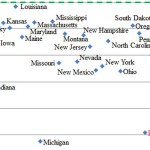Things We Read Today, 1
One thing I’ve learned, in years of blogging, is to be wary of proclaiming new regular features. Yet, I’ve been finding myself at the end of each day with a browserful of tabs of content on which I’m inclined to comment.
So, as interest and time allow, I’ll publish quick-hit posts containing commentary that is somewhere between a tweet and a full-on blog post.
The Scheme of the 20%
Be honest: no matter your political leanings, you questioned the Obama administration’s suggestion that its introduction of waivers for welfare-to-work provisions was aimed at tightening the nation’s safety net. Robert Rector, of Heritage, gives four reasons that your instincts were right:
- Employment exits [from welfare] will increase automatically when the economy recovers.
- States could meet the target simply with better record keeping.
- A 20 percent increase in exits is insignificant.
- More employment exits indicate a larger caseload.
Mickey Kaus supplies two more reasons:
I was initially skeptical of Sebelius’ 20% pledge, since a) it measures the 20% against “the state’s past performance,” not what the state’s performance would be if it actually tried to comply with the welfare law’s requirements as written, and b) Sebelius pulled it out of thin air only after it became clear that the new waiver rule could be a political problem for the president. She could just as easily drop it in the future.
I’d note, in closing, that Rector’s fourth reason is especially interesting in light of the “dependency portal” concept toward which Rhode Island is racing. If the federal government can waive work requirements, and if people who are tracked through the state’s ObamaCare health benefits exchange automatically are signed up for welfare whenever it technically applies to them (with reduced consideration of existing assets, by the way), the percentage of those who exit welfare by increasing their income will increase as a function of the fact that welfare is being given to folks who otherwise wouldn’t have sought it.
As Rector describes the opposite trend, back in the days of the 1990s reform: “New enrollments… declined because individuals who did not really need welfare aid, when confronted by a work requirement, simply chose not to enroll in welfare in the first place.”
Speaking of Twenty-Percents and Working
It’s very discouraging to think that there may be a strong contingent of locally powerful people who take economic cues from the Providence Journal editorial board:
Among the things that have encouraged such concentration of wealth is … [an] ever tighter link between education and success. Generally the richer your family, the better your education — not to mention lucrative contact-making. Thus the privileges of a self-perpetuating upper class became ever stronger, including in being able to control the political process.
While noting the general, all-around improvement of Americans’ economic well-being during the Reagan years, Kevin Williamson offers a tidbit worth considering in this context:
As Treasury figures from the era document, the vast majority (nearly 85 percent) of those who were poor in 1979 (meaning they resided in the lowest income quintile) were in a higher quintile by 1988; even more impressive, two-thirds of them had moved up two quintiles or more. And most impressive of all: Of the people who were in the lowest income quintile in 1979, more had moved to the top quintile by 1988 than remained in the bottom quintile. Which is to say, if you were on the bottom in 1979, you were statistically more likely to be on the top by 1988 than to remain at the bottom.
One wonders whether the Projo opinion writers think access to higher education was more or less egalitarian back then. Seems to me it was the latter. Of course, the editors go on to offer some of the same-old-same-old prescriptions, which may explain their search for excuses:
The economy is an immensely complicated creature, but there are a few things that ought to be done to widen the chance of people to better themselves. One is to raise the minimum wage to give lower-income people more purchasing power, which would also help energize the economy. (Only about 12 percent of people earning the minimum wage are teens, by the way.) In the past few years, Brazil raised its minimum wage by 60 percent and the nation boomed. Extreme concentrations of wealth are not good for the long-term health of economies or democracies.
As I noted in a recent policy brief, the evidence that higher minimum wages correspond with lower employment for low-income workers remains strong. They declare that higher wages for lower-income workers will “energize the economy,” but don’t highly paid journalists wonder from where the money will come to set wages above the level that the market suggests?
As for Brazil, the nation’s minimum wage is somewhere around $2.00 per hour (assuming a 40-hour workweek), yet it has the eighth most billionaires in the world. One suspects that it’s a bit presumptuous of the editors to imply causation between the minimum wage and the economic growth.
Some Attractive Peasant Work… Pedicabs and Rickshaws
More edifying than the aforementioned editorial in the Providence Journal today was a pair of front-page Donita Naylor pieces about pedicabs, or bicycle-like taxicabs (here and here). As a free-market populist, I find it difficult to know which way to go with this one. On the one hand, is this really the sort of work toward which Rhode Island wants to drive its able-bodied, self-motivated workers?
On the other hand, isn’t this a perfect example of the niche markets that could spring up unexpectedly if the state would stop trying to plan Rhode Islanders’ educations and lives for them and just let them do business?
For now, it’s enough to wonder whether these hardworking guys fall under the definition of “all other transit and ground passenger transportation” for the purposes of the state’s new tax on taxicabs, and if not, whether the General Assembly will move to correct this clear injustice in the next legislative session.
Creature Comforts and Evolution
And to end lightly on a bio-cultural note, a fascinating multidisciplinary conversation is bubbling up on the topic of wealthy societies’ falling fertility. The Economist kicked off today’s round with an article casting the subject in terms of evolution:
This explanation is that, according to circumstances, people switch between two reproductive strategies. One, known to ecologists as “r-selection”, is to produce lots of offspring but invest little in each of them. This works in environments with high infant mortality. The other, known as “K-selection”, is to have only a few offspring but to nurture them so that they are superb specimens and will thus do well in the competition for resources and mates, and produce more grandchildren for their parents than their less well-nurtured contemporaries. The demographic transition, according to this analysis, is a shift from r-type to K-type behaviour.
The problem, according to the study that sparked the article, is that the evolutionary strategy doesn’t work. The K-kids do better in school and make more money, but they don’t reproduce. So, evolutionary forces fade this demographic toward extinction (if I may project into the future a bit).
There’s a clear lesson, here, and it’s odd that even the conservative writers of National Review Online seem to skirt it (as represented here, here, and here). Namely, “K-type behavior” is not an evolutionary strategy so much as a marker of selfish interest. Reintroducing the crucial evolutionary principle of diversity is enough to illustrate that point.
Laypeople reading the Economist article might broadly articulate their response as, “Well, duh.” Most folks would wager on abundance over quality in any match-up, and if they know that the criteria are sex and childbirth, they’d ante even higher.
On a less-crass note, returning to my moral center as a religious conservative, it isn’t really shocking that people who model their lives on traditional and scriptural dicta would better align their lifestyles with natural evolution than do those who build their philosophies on the sorts of calculations that individuals can make from their own limited perspectives.



